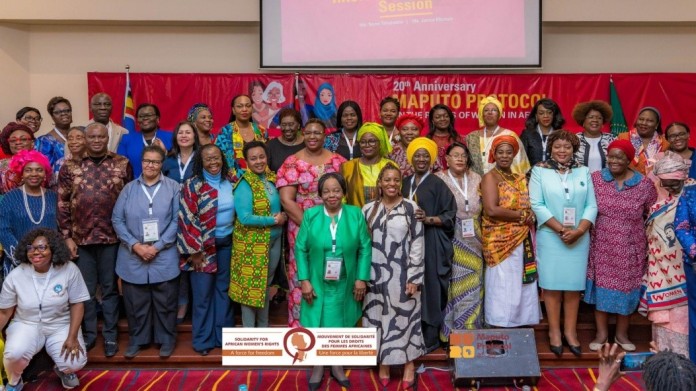By Amin Kef (Ranger)
On the occasion of the 20th Anniversary of the Maputo Protocol, on the 11th July, 2023 in Kenya, Nairobi, a groundbreaking report titled: “20 Years of the Maputo Protocol: Where are we now?” has been released by the Solidarity for African Women’s Rights Coalition (SOAWR), Equality Now, and Make Every Woman Count (MEWC). The report highlights the progress made in Africa regarding the ratification, domestication, and implementation of the Maputo Protocol, showcasing significant achievements and remaining challenges.
The Maputo Protocol holds immense importance as a legal instrument for promoting and safeguarding women’s rights in Africa. It addresses crucial issues affecting women’s lives, establishes a comprehensive legal framework, promotes women’s empowerment and participation, and sets a system of accountability for African countries. By integrating the Protocol’s principles into their legal systems, member states foster a culture of transparency and progress in promoting gender equality.
The Protocol explicitly condemns harmful practices such as female genital mutilation, child marriage, and violence against women, sending a clear message that these violations must be eradicated. Member states that incorporate the Protocol’s provisions into their legal frameworks ignite a culture of gender equality.
Adopted by the African Union (AU) in July 2003, the Maputo Protocol has become one of the most ratified instruments within the AU, with 44 out of 55 member states having ratified or acceded to it, and eight countries having signed but not yet acceded to it as of June 2023.
While 80% of AU member states have ratified or acceded to the Protocol, the report emphasizes that the full implementation of its provisions is still a work in progress, with some states submitting reservations to modify the legal effect of certain provisions. Nevertheless, human rights campaigners argue that allowing reservations is preferable to states not adopting the Maputo Protocol at all. Rainatu Sow, Director of Make Every Woman Count, states, “The ratification of the Protocol is a crucial step towards achieving gender equality. Ratifying the Maputo Protocol sends a powerful message that states are committed to protecting and promoting women’s rights.”
Challenges in reporting progress are also highlighted in the report, noting that only 19 states have submitted initial reports as required under Article 26(1) of the Protocol, and most of the reports have been significantly delayed. To address this, the SOAWR members emphasize the need for increased training of member states on reporting, improved data collection through cross-sector collaboration, and clearer reporting deadlines. They also call for the African Commission (ACHPR) to consider extending the reporting time frame.
The report reveals notable progress in certain areas while acknowledging disparities. Economic and social welfare rights have significantly improved in AU member states, with over 50% of African countries enacting laws mandating equal remuneration for work of equal value and providing paid maternity leave of 98 days or longer. Several countries have also prohibited discrimination based on gender and sexual harassment in the workplace.
Legislation related to marriage rights has been enacted, addressing issues such as the legal age of marriage and imposing stricter punishments for early, child, and forced marriages. Institutional reforms, including the establishment of national committees and awareness campaigns, have contributed to the prohibition of child marriage in some countries.
Regarding health and healthcare, almost all countries have maintained constitutional provisions related to health, with six countries enshrining rights related to reproductive healthcare. Legislative reforms integrated with laws on equality and gender-based violence have supported reproductive health rights. Efforts to combat violence against women, including female genital mutilation (FGM), have led to constitutional reforms, national action plans, and the establishment of support services.
In terms of women’s participation in political and decision-making processes, constitutional provisions establishing quotas on women’s representation in legislatures have been implemented in ten countries. National gender or development strategies have integrated approaches to increase women’s participation in politics, and awareness campaigns and initiatives have been launched to enhance representation.
The report also explores the state of protecting women and girls from violence in armed conflict and the rights of specially protected women’s groups. It highlights the attention given to these issues by AU countries, with constitutional and institutional reforms being implemented.
Despite the progress made over the past two decades, challenges remain. African governments are urged to prioritize the elimination of harmful traditional practices, gender-based violence, and discrimination against women and girls. Faiza Mohamed, Africa Regional Director at Equality Now, emphasizes the importance of harmonizing national laws with the principles outlined in the Maputo Protocol and addressing deeply entrenched societal beliefs to achieve gender equality.
The launch ceremony for the report took place on July 11, 2023, in Nairobi, Kenya, during the high-level celebrations of the Maputo Protocol’s 20th Anniversary. Hon. Aisha Jumwa, the Cabinet Secretary for Kenya’s Ministry of Public Affairs, Gender and Affirmative Action, underscored the significance of the Maputo Protocol as a crucial framework for women’s rights. She emphasized the need for countries to reaffirm their commitments, accelerate efforts, and allocate adequate resources to realize the aspirations of women and girls in Africa.
The SOAWR Coalition calls upon the 11 remaining AU member states – Botswana, Burundi, Central African Republic, Chad, Egypt, Eritrea, Madagascar, Morocco, Niger, Somalia, and Sudan – to renew their commitments and promptly ratify the Maputo Protocol. By doing so, they will fulfill their promises to the women and girls in their countries, contributing to a more equitable and prosperous continent.




